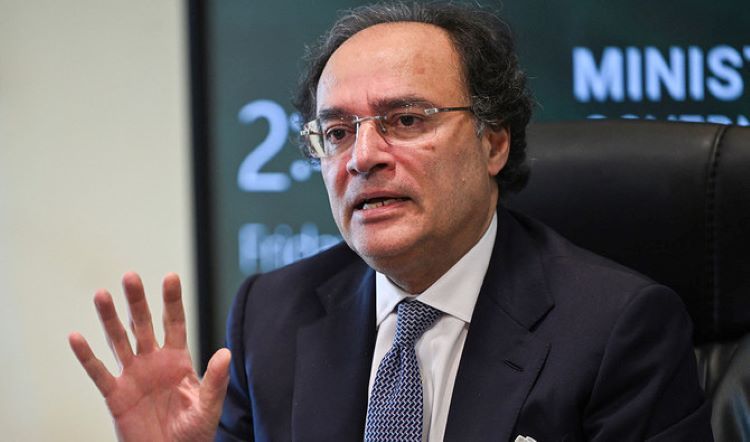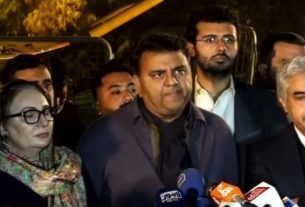ISLAMABAD: Finance Minister Muhammad Aurangzeb said Thursday the federal government was hopeful of reaching a staff-level agreement with the International Monetary Fund (IMF) in July after the budget was presented in line with the lender’s requirements.
The budget, which analysts believe has been tailored to meet IMF requirements for securing another bailout of $6 to $8 billion under the medium-term Extended Fund Facility (EFF), marks a 25% increase over the outgoing fiscal year’s outlay.
“The discussion with IMF is moving in the right track […] we are hopeful and we aim to reach a staff-level agreement in July,” the finance minister told reporters during the post-budget press conference.
The minister said virtual discussions were underway with the Fund’s team and they’re exchanging views on the budget as well. “I don’t want to say anything in finality other than the fact that it’s moving positively.”
The government has set a challenging tax revenue target of Rs13 trillion for the next fiscal year starting July 1, a near 40% jump from the current year, in the national budget that looked to strengthen the case for a new bailout deal with the IMF.
As the authorities find ways to increase revenues to reduce fiscal deficit as part of reforms being discussed with the IMF, they have raised taxes that will fetch additional revenues of Rs3.8 trillion in line with the IMF demands.
The government has jacked up taxes on salaried, non-salaried class, real estate, retailers, vehicles, removed GST exemptions and slapped taxes on milk and milk products, mobile phones, and tier-1 retailers of branded stores at 18%.
On a question of reservations by the Pakistan Peoples’ Party on the Rs18.7 trillion budget, the federal minister said that all the allied parties were given a briefing on the budget proposal and were taken on board.
Gradual PDL increase
The minister said that the increase in petroleum development levy (PDL) will be gradual and linked with international oil prices.
“Petroleum levy will not increase immediately. But will be increased in a phased manner over the next fiscal year,” he said, adding that the prices of oil in the international market will be taken into consideration when making that decision.
While unveiling the budget a day earlier, he had, for the next fiscal year, proposed an increase in the maximum limit of petroleum development levy (PDL) on diesel and petrol by up to Rs80 per litre.
The federal minister had said that the government will target a budget deficit of 6.9% of its GDP. According to Finance Bill 2025, the maximum PDL limit on high-speed diesel oil and petrol has been hiked by Rs20 to Rs80 per litre.
While there’s no change in PDL on superior kerosene oil (SKO) which is kept at Rs50, it has been increased on light diesel oil (LDO), high-octane blending component (HOBC), and E-10 gasoline to Rs75 from Rs50.
Additionally, the PDL on LPG (produced/extracted in Pakistan) has been kept unchanged at Rs30,000 per metric tonne.
As per the budget document, the government plans to collect Rs1,281 billion under this head.
Taxing salaried class, non-filers
While responding to a question about whether the salary slab will be revised or remain the same, the minister said that taxes for the exempted class and those in the top slab category have been maintained.
“If you compare it with the non-salaried class, which includes the professional community, we have increased it to 45%,” he said, adding that there are some changes in tax slabs and there is no doubt about it.
However, he maintained that tax base will be broadened with tax to Gross Domestic Product (GDP) to be taken to 13%.
The minister maintained that the 10% tax-to-GDP ratio is unsustainable and in the next 2-3 years they have to take it to 13%.
He further stated that the concept of non-filers is only in Pakistan and no other country in the world; therefore, the tax rate has been increased for non-filers.
Aurangzeb insisted that higher taxes would be imposed on those with higher incomes, adding that no one should object to it.
“The undocumented economy is being digitised on an end-to-end basis,” he said, further stating the development will reduce human intervention and bribery. “Business transaction tax is being increased for non-filers,” he said.
When commenting on taxing retailers, the minister said the government began their registration on a voluntary basis in April and invited them to register themselves through an application, which was only done by 75 people.
“In May, the FBR’s workforce mobilised and registered 31,000 retailers,” he said, adding that this campaign will continue as the collection of tax will begin from July.
He insisted that the tax on retailers and wholesalers should have been imposed in 2022. “We protected [them] as much as we could… We have no choice but to bring this sector into the tax net.”
Aurangzeb said digitisation of the economy is a priority for the government, as it will help reduce corruption and increase transparency.
The finance minister acknowledged the significance of freelance professionals in Pakistan, as it has the third largest freelancer population in the world.
With regards to the government’s seriousness towards efforts for the information technology (IT) sector, the minister said: “A huge amount has been allocated for the IT sector. Infrastructure in the IT sector can be improved with the allocated money.”__The News





